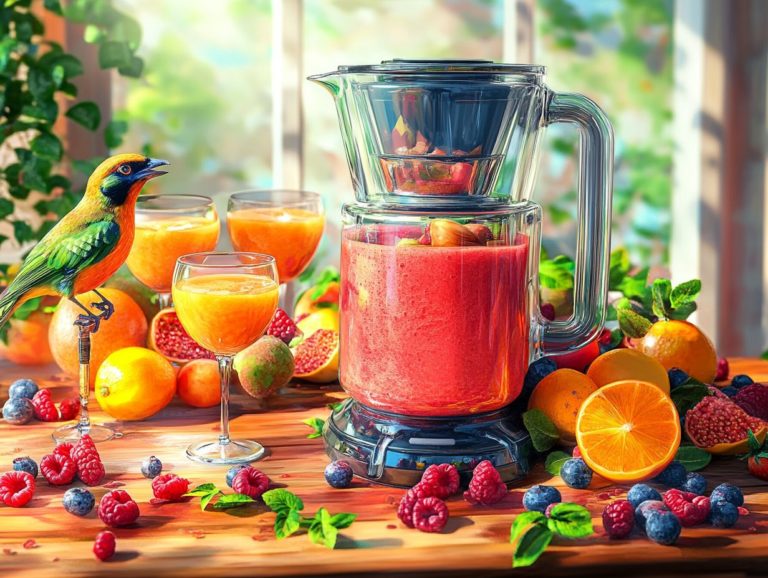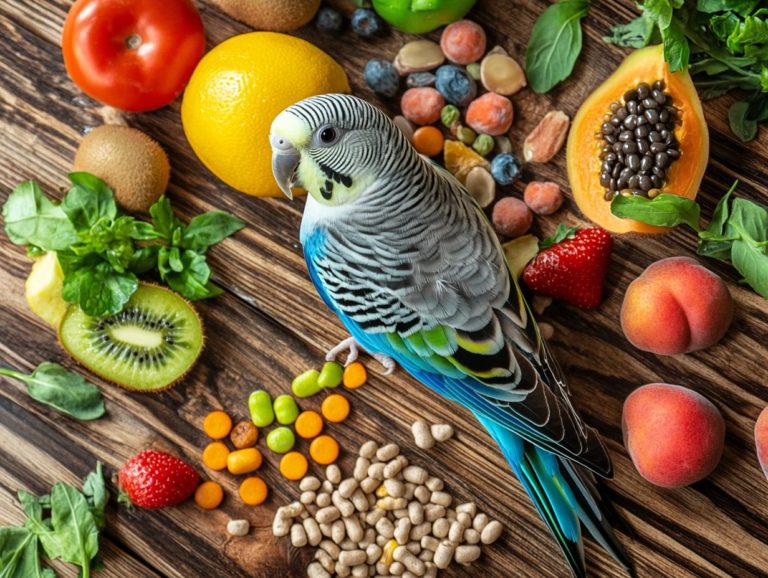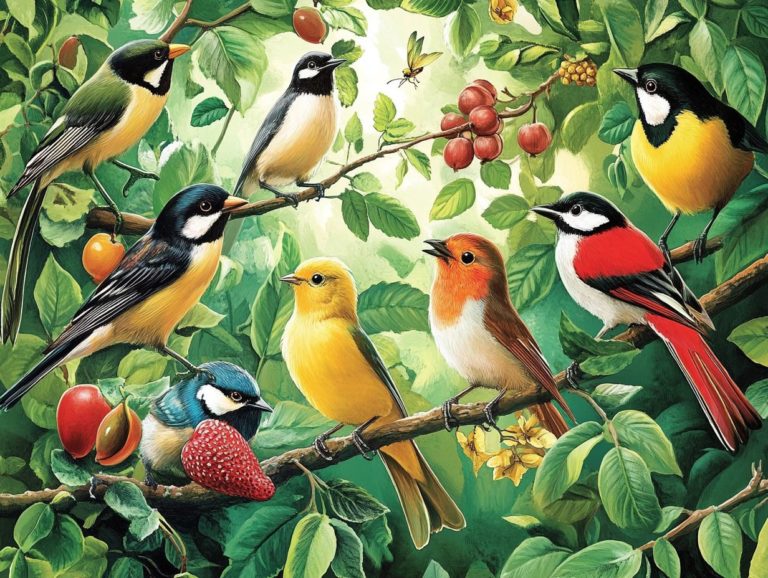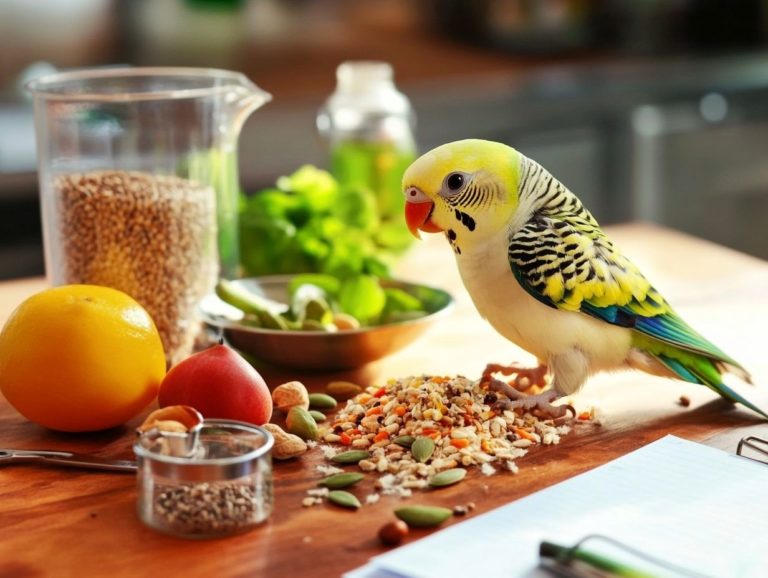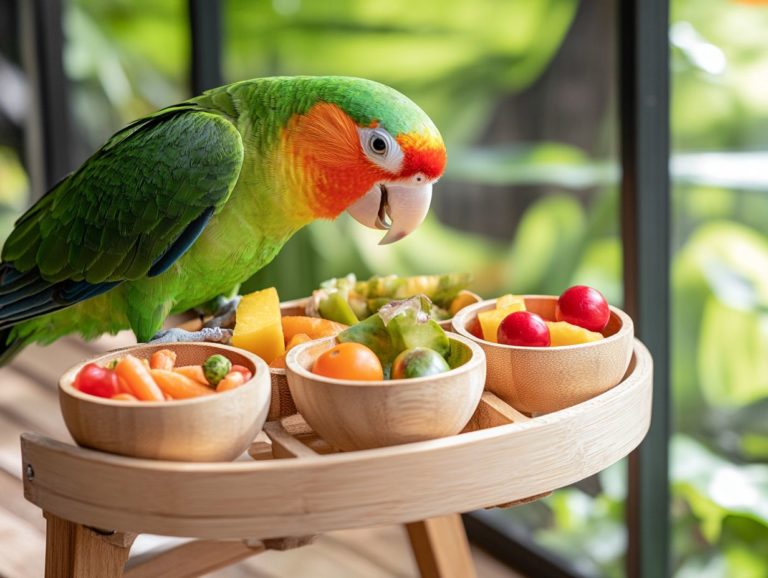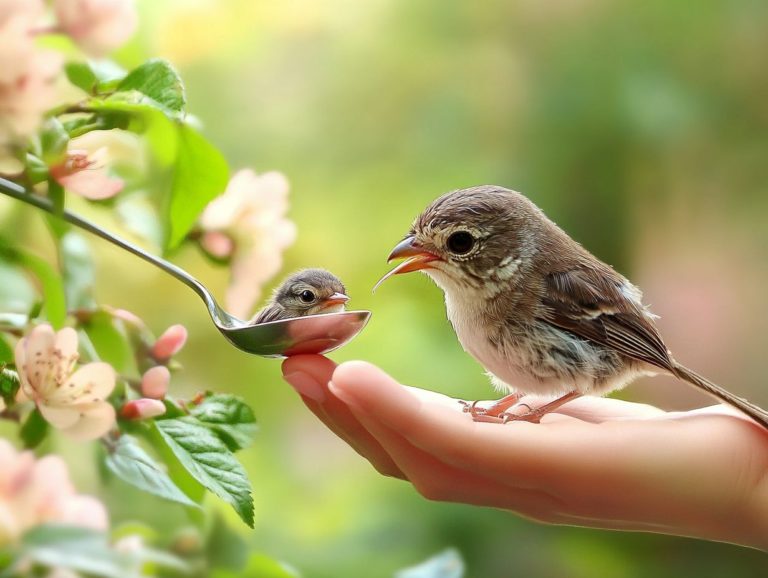10 Foods That Are Toxic to Birds
When it comes to caring for your feathered friends, knowing what to feed them is crucial for their health and happiness. Many toxic foods can be downright dangerous for birds.
This article delves into ten common toxic foods that can harm pet birds, ranging from avocado to apple seeds. It also discusses the symptoms of poisoning and the specific effects each harmful item can have on your avian companions.
Understanding these risks is essential to ensuring a safe and loving environment for your pet birds.
Contents
- Key Takeaways:
- 1. Avocado
- 2. Chocolate
- 3. Caffeine
- 4. Alcohol
- 5. Onions and Garlic
- 6. Salt
- 7. Raw or Undercooked Meat and Eggs
- 8. Mushrooms
- 9. Tomato Leaves and Stems
- 10. Apple Seeds
- 11. What Are the Symptoms of Avocado Poisoning in Birds?
- 12. How Can Birds Be Exposed to Chocolate and What Are the Effects?
- 13. Why Is Caffeine Toxic to Birds?
- 14. What Are the Signs of Alcohol Poisoning in Birds?
- 15. How Do Onions and Garlic Affect Birds?
- 16. What Are the Risks of Giving Salt to Birds?
- 17. Why Should Birds Avoid Raw or Undercooked Meat and Eggs?
- 18. What Are the Dangers of Mushrooms for Birds?
- 19. Can Birds Eat Tomatoes and What Parts Should Be Avoided?
- 20. Why Are Apple Seeds Harmful to Birds?
- Frequently Asked Questions
- What are 10 foods that are toxic to birds?
- Why are these foods toxic to birds?
- Can even small amounts of these foods be dangerous for birds?
- What are the signs of poisoning in birds from these foods?
- Are there any safe alternatives to these toxic foods for birds?
- What should I do if my bird accidentally consumes one of these toxic foods?
Key Takeaways:
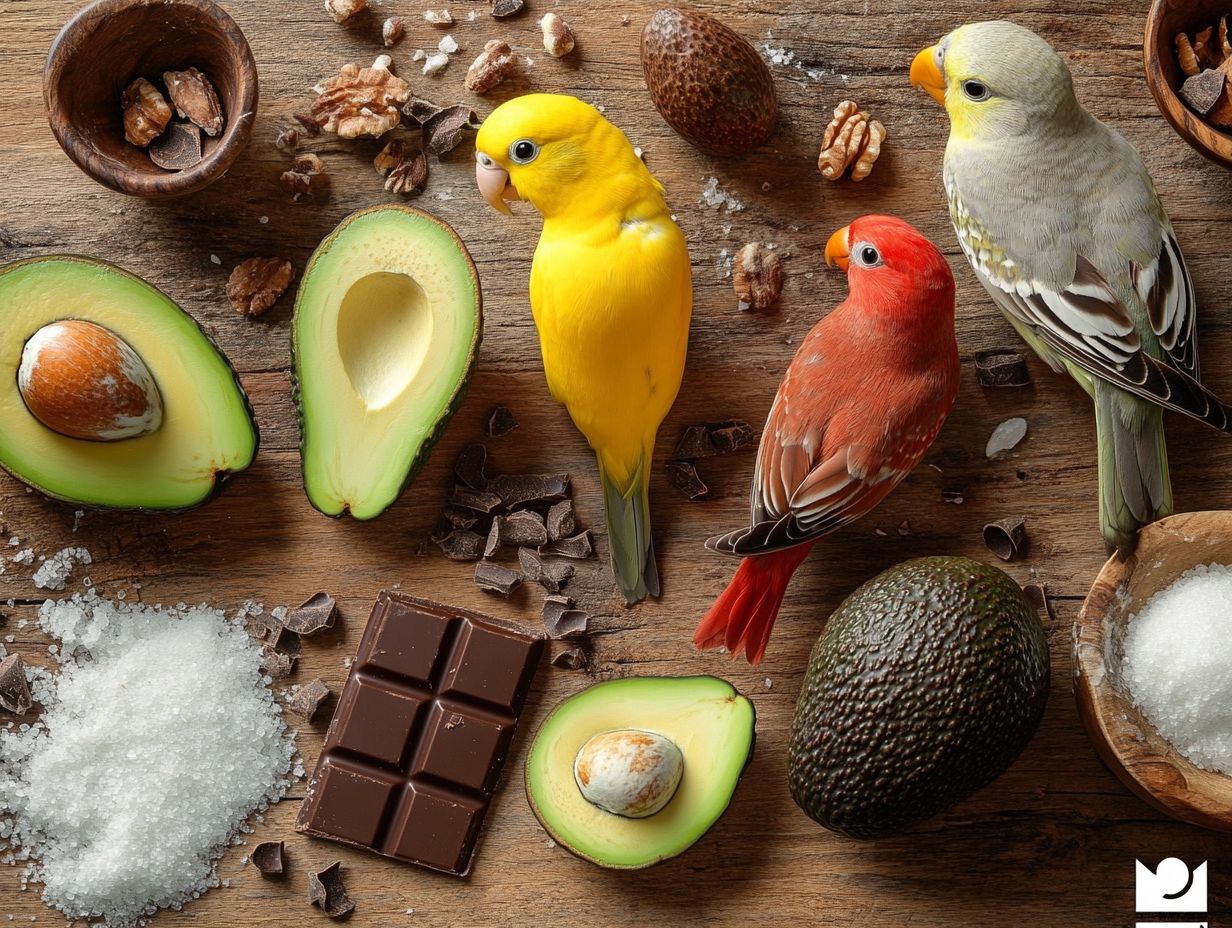
- Avocado, chocolate, caffeine, alcohol, onions, garlic, salt, raw or undercooked meat and eggs, mushrooms, tomato leaves and stems, and apple seeds are all toxic to pet birds and should be avoided in their diet.
- Birds can experience symptoms such as difficulty breathing, weakness, and organ failure if exposed to these toxic foods.
- Every bird owner must know these facts! Always check the ingredients in your bird’s food and treats to ensure they are safe for consumption.
1. Avocado
Avocado is celebrated for its rich, creamy texture and impressive nutritional benefits for humans. However, for your pet birds, it poses a serious threat due to avocado toxicity, which can lead to severe health issues such as heart damage and respiratory distress.
As a conscientious bird owner, it’s vital to guard against toxicity in their diet. Certain compounds primarily persin, a compound found in avocados that is harmful to birds can be detrimental. Watch for symptoms of poisoning, which may include difficulty breathing, lethargy, and a sudden drop in appetite.
These signs should never be disregarded, as they may indicate serious health problems related to avocado toxicity. Dr. Laurie Hess, a well-respected avian veterinarian, stresses the importance of seeking immediate veterinary care if you notice any of these symptoms.
Prevention is essential; therefore, it’s best to avoid giving avocados to your birds. Instead, choose safer, bird-friendly fruits and vegetables. By staying informed and proactive, you can help ensure the well-being of your beloved avian companions.
2. Chocolate
Chocolate may be a delightful indulgence for you, but for your pet birds, it s a perilous treat that you should avoid at all costs. The theobromine and caffeine it contains can lead to serious health issues, including heart damage and even death.
As a responsible bird owner, you must remain vigilant about the dangers of chocolate and ensure your home is free from this toxic temptation that could harm your feathered companions. Birds metabolize these compounds much more slowly than mammals, meaning that even a tiny amount can be potentially lethal.
If your bird happens to ingest chocolate, symptoms of poisoning can appear rapidly. You might notice signs such as agitation, rapid breathing, increased heart rate, tremors, and gastrointestinal distress.
If you suspect that your bird has tasted chocolate, act swiftly. Remove any leftover chocolate from the area and keep a close eye on your bird for any symptoms. Immediate consultation with a veterinarian is essential, as their professional intervention can greatly influence the outcome and survival of your beloved pet.
3. Caffeine
Caffeine, a common staple in coffee and tea, can pose serious risks to pet birds, including an elevated heart rate and potential health issues like respiratory distress. As a responsible bird owner, understanding the effects of caffeine is crucial for safeguarding the well-being of your feathered companions.
Birds are far more sensitive to caffeine than humans, with even minor exposure leading to symptoms such as hyperactivity, tremors, and, in severe cases, seizures. Recognizing the signs of caffeine toxicity is vital, as these effects can escalate rapidly, necessitating immediate veterinary care.
It s essential to remove caffeinated products from your home and securely store food and drinks. To enhance safety, consider creating a bird-proof zone within your living space where your birds can play freely, away from any hazardous substances.
Should exposure occur, prompt veterinary intervention can significantly improve the outcome for your cherished avian friend.
4. Alcohol
Alcohol may be a common recreational choice for humans, but it poses serious risks to pet birds. Just a small amount can lead to severe health issues, including respiratory distress or even fatal outcomes.
As a bird owner, it s vital to understand these risks and take proactive measures to protect your avian companions from toxicity.
Various types of alcohol think wine, beer, and spirits can easily be left unattended on countertops or tables. Curious birds can access them without a second thought.
If you notice signs of alcohol poisoning in your bird, such as lethargy, lack of coordination, or vomiting, it s crucial to act swiftly. Remove the source of the alcohol immediately.
Keep a close eye on your feathered friend for any warning signs. Don t hesitate to seek veterinary care right away! Professional treatment might be necessary to safeguard your bird’s health.
Remember, time is critical, and an avian veterinarian is best equipped to handle these emergencies effectively.
5. Onions and Garlic
Onions and garlic, kitchen staples adored by many, can actually present serious health risks for your pet birds. Their potential to cause onion and garlic toxicity can lead to stomach problems and even more severe health complications.
It’s essential for you, as a bird owner, to remain vigilant about avoiding these toxic foods in your bird s diet to ensure their well-being.
These culinary favorites contain compounds like thiosulfate and sulfoxides, which are harmful to birds. They can damage red blood cells and potentially result in conditions such as hemolytic anemia, a condition where red blood cells break down, causing weakness.
You should be on the lookout for common symptoms of exposure, including lethargy, vomiting, and diarrhea.
However, there could be more insidious long-term effects that compromise your bird’s immune system and overall vitality.
Ingestion of these ingredients could lead to lasting damage that may not be immediately apparent. Therefore, regular monitoring is critical.
If you suspect your bird has been exposed to onion or garlic toxicity, seek immediate veterinary care! Trained professionals can provide the necessary treatment.
Instead of onions and garlic, consider offering safe alternatives like parsley or basil. These herbs can add delightful flavor to your bird’s meals without the associated dangers.
6. Salt
While salt is necessary for many living beings, understanding the effects of salt is crucial for bird owners! Excessive salt intake can have harmful consequences for pet birds.
This can lead to salt toxicity, kidney failure, and a range of serious health issues.
Common sources of excess salt include commercial bird feeds, treats, and even human foods that may contain hidden sodium. Be vigilant about what you offer.
Symptoms of salt toxicity in birds can manifest as increased thirst and urination. However, these can escalate to more severe problems like lethargy, seizures, or even death if not addressed promptly.
High-fat and salty foods can increase health risks, potentially leading to obesity and added strain on the kidneys.
If you suspect your bird has been exposed to salt, seeking immediate veterinary care is crucial! This ensures that your avian friend receives timely intervention and support necessary to safeguard their health.
Keep your feathered friends safe by always checking their food for hidden salt!
7. Raw or Undercooked Meat and Eggs
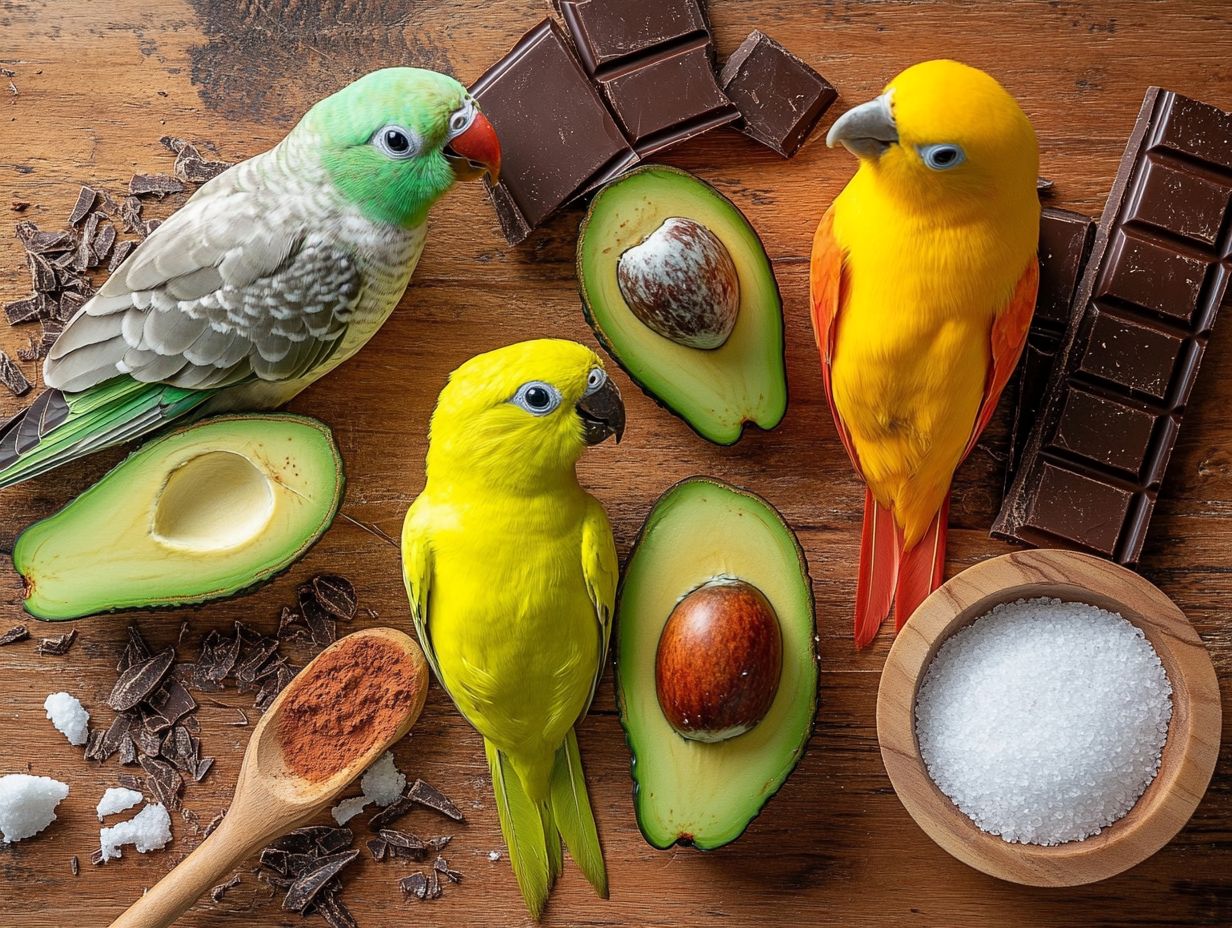
Raw or undercooked meat and eggs are high in protein for humans, but they pose serious health risks for pet birds. These risks include salmonella and other infections that can lead to severe health issues. Make sure to keep your birds safe by recognizing the dangers of these toxic foods.
Salmonella can seriously harm a bird s stomach. Symptoms include vomiting and diarrhea, especially dangerous for small birds. Bacteria like E. coli and Campylobacter can also be found in raw animal products, which may weaken your bird’s immune system and overall health.
Instead, consider offering cooked protein sources, such as legumes or high-quality bird-safe pellets enriched with essential nutrients. This ensures a balanced diet free from harmful pathogens. A varied diet rich in fruits, vegetables, seeds, and nuts promotes optimal health and enhances vitality and longevity in pet birds, helping them thrive.
8. Mushrooms
Mushrooms may add a gourmet touch to your meals, but for pet birds, they can be a recipe for disaster. These fungi can be toxic, causing serious health issues like gastrointestinal distress and even organ failure. Bird owners must recognize the dangers of mushrooms and keep them away from their feathered companions diets.
Some varieties, especially Amanita and Gyromitra species, are very dangerous. They can cause symptoms like vomiting and diarrhea, along with more serious issues like lethargy and seizures. If your bird accidentally eats mushrooms, seek prompt veterinary advice. Quick action can prevent a rapid decline in health. Watch for any unusual behavior or physical signs after ingestion, as this vigilance is key to determining the best course of action.
In the meantime, consider safe dietary alternatives like fresh fruits, grains, and leafy greens. This way, your birds receive the vital nutrients they need while avoiding toxicity. With proper education and attentiveness, you can enhance the safety and well-being of your beloved pets.
9. Tomato Leaves and Stems
Tomato leaves and stems contain solanine, a harmful chemical that poses a risk to pet birds. This can lead to serious health issues like gastrointestinal distress and neurological problems. As a dedicated bird owner, it s essential to keep these toxic parts of the tomato plant out of reach to protect your avian companions.
Solanine exposure can cause concerning symptoms in birds, such as vomiting, diarrhea, lethargy, and in severe cases, seizures. Recognize these risks and choose safe foods that enhance your birds’ well-being.
The flesh of the tomato is safe for birds, but avoid the leaves and stems entirely. To promote your birds’ health, offer ripe, red tomato flesh in moderation, making sure to discard any potentially harmful parts beforehand.
10. Apple Seeds
Apple seeds contain amygdalin, which can release cyanide during digestion, posing a toxic threat to your pet birds. This can lead to serious health issues like respiratory distress and, in the worst-case scenario, death. As a bird owner, it’s important to be vigilant about apple seeds and protect your feathered friends from dietary toxins.
The dangers of these seeds are significant; even a small amount can cause symptoms like difficult breathing, lethargy, or convulsions in birds. To safely introduce apples into your pets’ meals, always provide seedless apple flesh, chopped into small, manageable pieces for easy eating.
Monitoring your pet’s reaction to new foods is essential. If you think your bird might be poisoned, get veterinary help right away to save their life. Quick action can prevent severe consequences associated with the overlooked dangers of this seemingly innocuous fruit.
11. What Are the Symptoms of Avocado Poisoning in Birds?
Avocado poisoning in birds can present itself through a range of symptoms, such as lethargy, vomiting, and respiratory distress. Recognizing these signs is vital, as quick action can save your bird’s life!
Additional symptoms could include diarrhea, abdominal pain, and, in severe cases, even sudden death if not addressed in a timely manner. Given the perilous nature of avocados for birds, it’s imperative for you to remain vigilant and proactively eliminate any potential access to this fruit.
By educating everyone in your household about the associated dangers, you can significantly mitigate the risk of accidental ingestion. Regular consultations with your veterinarian will also help you stay informed about other foods that could pose threats, ensuring a safe and healthy environment for your cherished pets. Always consult your vet if you suspect your bird has ingested something harmful.
12. How Can Birds Be Exposed to Chocolate and What Are the Effects?
Birds can encounter chocolate in various ways, whether through dropped treats or the allure of shared human food, which can lead to severe consequences like vomiting, diarrhea, and heart issues. It’s essential for bird owners to remain vigilant about chocolate exposure and to understand the critical need for prompt veterinary attention in such cases.
Common scenarios include festive gatherings brimming with chocolate desserts or carelessly leaving snacks within reach of your inquisitive feathered companions. Theobromine found in chocolate is particularly toxic to birds, potentially causing increased heart rates, seizures, and in severe instances, even death.
Watch for signs of distress, such as excessive preening, a diminished appetite, or changes in droppings these are vital indicators that call for immediate action. By ensuring that all chocolate products are securely stored away from pets, you can help prevent these unfortunate situations while safeguarding their health. Always consult your vet if you suspect your bird has ingested something harmful.
13. Why Is Caffeine Toxic to Birds?
Caffeine poses a significant threat to birds, primarily due to its stimulating effects on their central nervous system. This can lead to troubling symptoms, including increased heart rate, restlessness, and even serious health issues like respiratory distress. By understanding the reasons behind caffeine’s toxicity in birds, you can take proactive steps to protect your avian companions from accidental exposure.
This fascinating compound can disrupt crucial body functions, such as how the body uses energy and fat breakdown. Everyday items like coffee, tea, and chocolate are common sources of caffeine that can be particularly hazardous for your feathered friends. Even small ingestions can lead to harmful effects, underscoring the importance of vigilance in bird care.
Symptoms of caffeine toxicity can escalate rapidly, potentially resulting in complications that require immediate veterinary intervention. By recognizing these risks, you give yourself the power to create a safe environment, free from substances that could jeopardize your pets’ well-being. Always consult your vet if you suspect your bird has ingested something harmful.
14. What Are the Signs of Alcohol Poisoning in Birds?
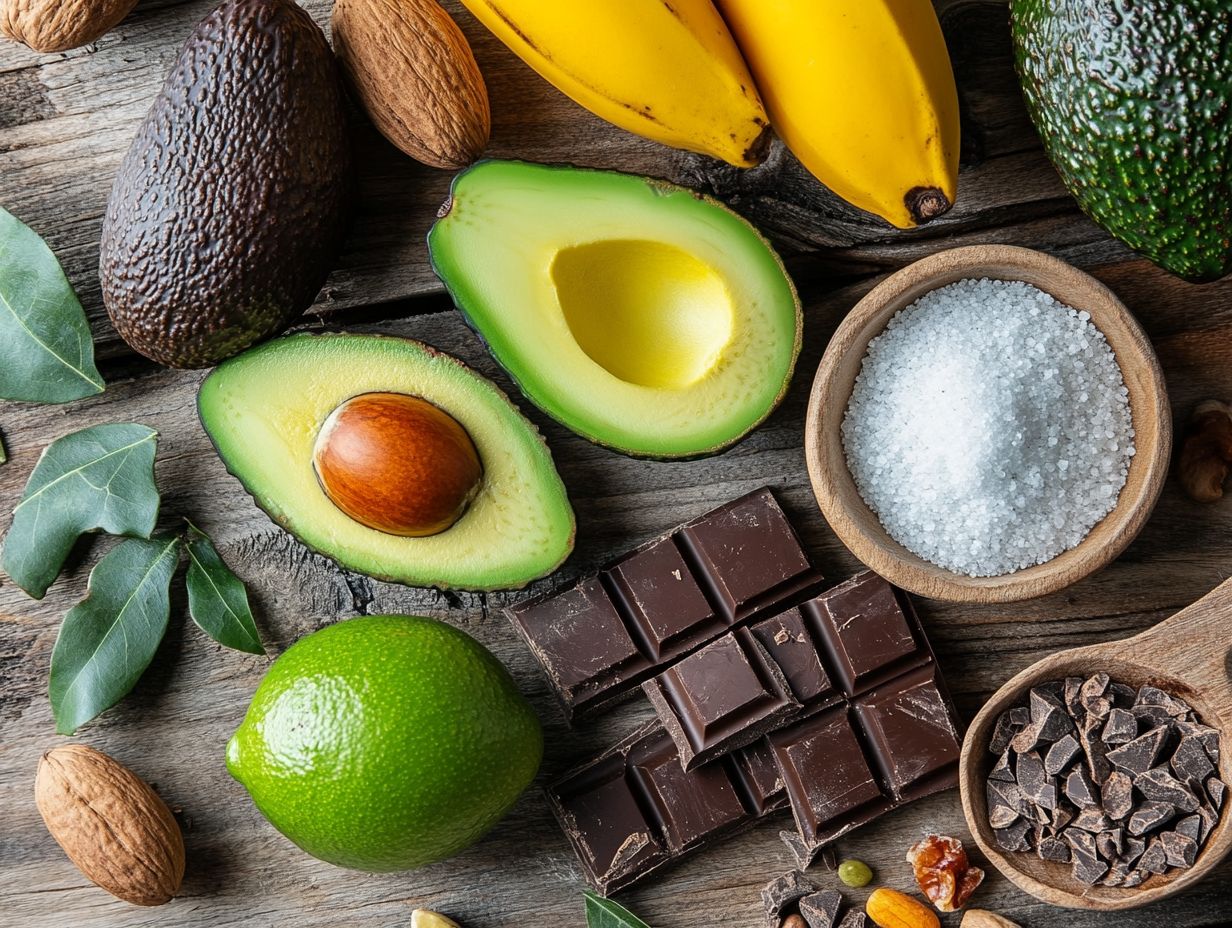
Signs of alcohol poisoning in birds can manifest as lethargy, difficulty with coordination, and respiratory distress, all of which demand immediate veterinary attention to avert long-term health complications. As a bird owner, it s imperative to learn the signs of alcohol poisoning to safeguard your feathered friends.
Beyond these concerning symptoms, you may notice affected birds displaying unusual vocalizations or exhibiting changes in behavior, such as increased agitation or withdrawal. Early recognition is vital; delaying treatment can lead to severe consequences, including organ failure or even death.
To prevent such tragic outcomes, it s essential to cultivate a safe living environment by keeping alcohol and any alcohol-based products entirely out of reach. Educating your family members about these dangers is crucial. Taking proactive measures not only protects your cherished companions but also raises awareness within your community, fostering a more responsible approach to pet care. Always consult your vet if you suspect your bird has ingested something harmful.
15. How Do Onions and Garlic Affect Birds?
Onions and garlic can harm birds, leading to toxicity that manifests as weakness, vomiting, and potentially long-lasting health issues, including damage to red blood cells. For pet owners, understanding the impact of these foods is crucial to providing a safe and nutritious diet for your avian companions.
These ingredients contain specific compounds like thiosulfate and sulfoxides that, when ingested, can instigate oxidative stress and hemolytic anemia in birds. Given their unique metabolism, birds are particularly sensitive to these substances. Even a small amount of onion or garlic can be detrimental. Ingestion can trigger a cascade of unfortunate reactions think lethargy, breathing difficulties, and a noticeable dip in energy levels.
Hence, it s essential for bird caretakers to remain vigilant and keep their birds away from these toxic foods entirely, safeguarding their health and overall well-being.
16. What Are the Risks of Giving Salt to Birds?
Salt can harm birds, leading to health risks such as kidney failure and salt toxicity. You might notice symptoms like excessive thirst and urination, which serve as red flags. Understand the dangers of salt to protect your birds!
The long-term effects of sodium buildup in a bird’s body can jeopardize their health, possibly leading to organ damage and a heightened susceptibility to infections. If you notice signs of salt toxicity, seek veterinary help immediately!
To prevent these issues, focus on providing a diet rich in fresh fruits, vegetables, and specially formulated pellets free from added salts. Regularly monitor their food intake and always ensure they have access to fresh water to help reduce the risks associated with excessive salt consumption.
17. Why Should Birds Avoid Raw or Undercooked Meat and Eggs?
You should not feed raw or undercooked meat and eggs to your birds. The risk of pathogens like salmonella is too high, leading to serious health issues, including gastrointestinal infections. As a bird owner, knowing the dangers of these foods is crucial for maintaining a safe and healthy diet for your pets.
Beyond salmonella, be aware of other concerning pathogens such as E. coli and Campylobacter. These germs can seriously upset your birds stomachs, leading to severe illness, dehydration, or worse.
To ensure your feathered friends get a safe source of dietary protein, consider offering them options like:
- Cooked eggs for protein
- Legumes for nutrition
- Commercially prepared bird-safe pellets
These choices are crafted to meet the specific nutritional needs of your pet birds. By ensuring all food is thoroughly cooked and free from contaminants, you can protect your beloved companions from preventable diseases.
18. What Are the Dangers of Mushrooms for Birds?
Mushrooms may be a healthy food choice for you, but they can pose serious risks to pet birds. Certain varieties harbor toxins that could lead to severe health issues, including organ failure. As a bird owner, it’s essential to understand the dangers of mushrooms to keep your feathered companions safe from potential harm.
While common edible types like button or portobello mushrooms are generally safe when prepared correctly, others, like the death cap or fly agaric, can trigger life-threatening reactions. Symptoms of poisoning can manifest as lethargy, tremors, gastrointestinal distress, or even respiratory failure issues that can escalate rapidly. Recognizing these signs early is crucial, as swift veterinary intervention can be lifesaving.
Consult a veterinarian at the first hint of mushroom ingestion. This ensures that any potential toxins are evaluated and appropriate treatments are administered without delay, ultimately protecting the health of your cherished pets.
Keep your birds safe by avoiding these foods!
19. Can Birds Eat Tomatoes and What Parts Should Be Avoided?
Tomatoes can be a nutritious addition to your bird’s diet. However, it’s essential to steer clear of certain parts of the plant, such as the leaves and stems, as they are toxic. As a bird owner, it’s crucial to know which tomato components are safe to incorporate into your pet’s meals to avoid health issues.
The flesh and seeds of ripe tomatoes are perfectly safe for birds. They offer a refreshing snack packed with vitamins and hydration. Just be sure to wash these parts thoroughly and ensure they re fresh, as pesticides can linger on the surface.
When introducing tomatoes into their diet, it s best to start with small amounts and monitor for any adverse reactions. Avoid unripe fruit, as it contains a substance that can be harmful to birds.
To prepare tomatoes properly, slice them into manageable pieces. This makes it easier for your birds to enjoy while minimizing the risk of choking.
20. Why Are Apple Seeds Harmful to Birds?
Apple seeds contain amygdalin, which can release cyanide when metabolized. This poses serious risks to your beloved pet birds and can lead to health issues such as respiratory distress or even death. To keep your bird safe, always remove the seeds when feeding apples.
Cyanide exposure can result in alarming symptoms, including lethargy and difficulty breathing. You need to understand these dangers, as even a small quantity of seeds can be harmful.
To safely incorporate apples into your bird’s diet, always choose seedless pieces and cut the fruit into manageable sizes. Watch for any reactions initially to catch distress signals early.
Offering apples as a treat can be both enriching and delightful for your birds. Remember: safety should always be your top priority.
Frequently Asked Questions
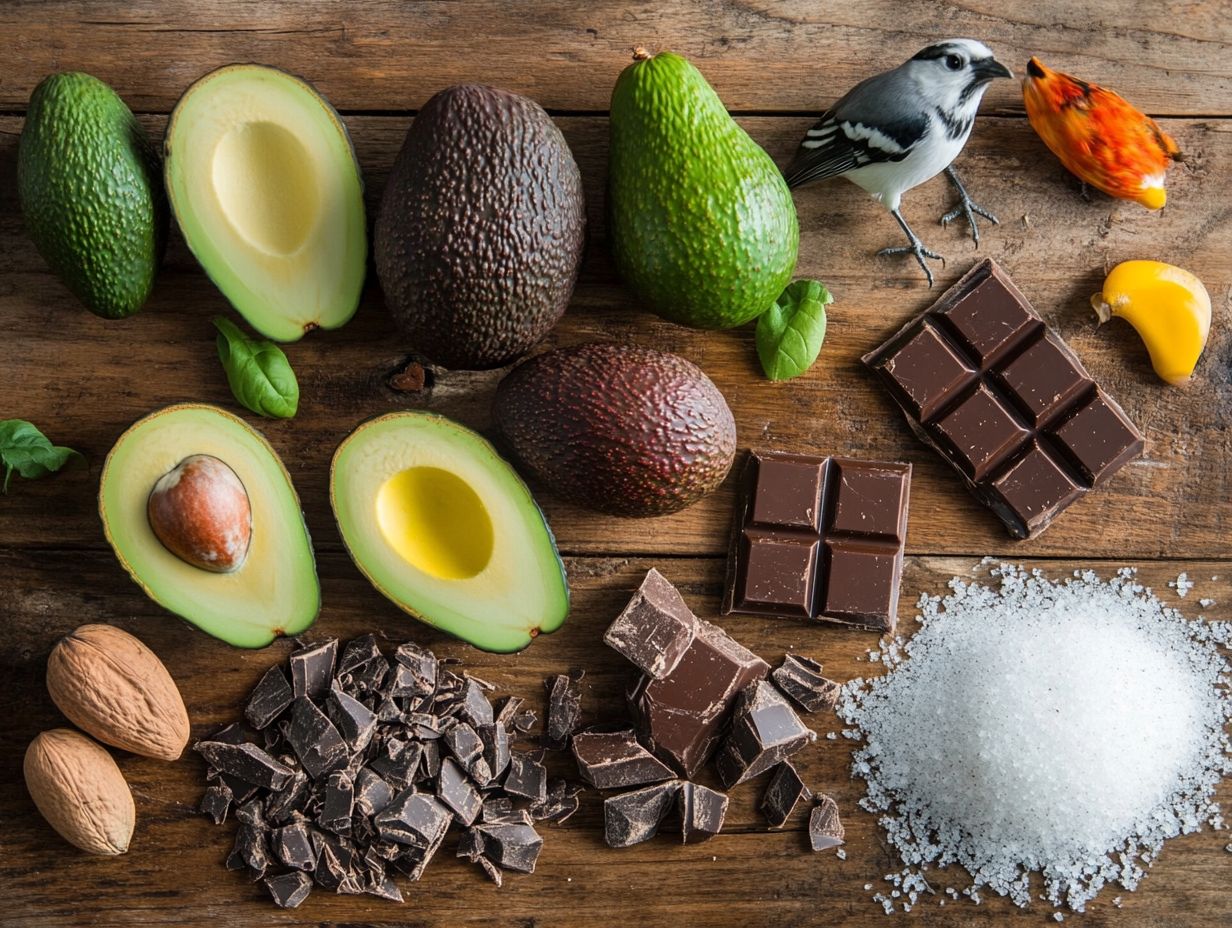
What are 10 foods that are toxic to birds?
The 10 foods that are toxic to birds include chocolate, avocado, caffeine, alcohol, salt, onions, garlic, mushrooms, apple seeds, and rhubarb. It’s crucial to be aware of these common toxic foods for birds to avoid.
Why are these foods toxic to birds?
These foods contain substances that are harmful to birds, such as theobromine in chocolate and persin in avocado, while knowing the 5 favorite foods of pet birds can help ensure a healthier diet for your feathered friends.
Can even small amounts of these foods be dangerous for birds?
Yes, even small amounts of these toxic foods can be dangerous for birds because their bodies are smaller and more sensitive to certain substances.
What are the signs of poisoning in birds from these foods?
Signs of poisoning in birds can include vomiting, seizures, diarrhea, difficulty breathing, and even death.
Are there any safe alternatives to these toxic foods for birds?
Yes, many safe alternatives exist, such as fresh fruits and vegetables, seeds, and grains specifically formulated for birds.
What should I do if my bird accidentally consumes one of these toxic foods?
If your bird has consumed a toxic food, act fast! It’s important to seek immediate veterinary care. In some cases, inducing vomiting may be recommended, but do not do this without consulting a veterinarian first.

